OpenAI just rolled out ChatGPT Pulse, a new mobile feature that analyzes your calendar, email, and chat history to deliver personalized daily briefings. Available exclusively to Pro users initially, Pulse represents OpenAI's latest push into AI agents that can proactively research and present information without prompting. The move signals the company's shift from reactive chatbots to predictive AI assistants that anticipate user needs.
OpenAI is making its biggest personalization bet yet with ChatGPT Pulse, a new mobile feature that transforms the chatbot from a reactive Q&A tool into a proactive daily assistant. The company quietly rolled out Pulse to Pro subscribers this week, marking a significant shift in how AI assistants operate.
The feature works by analyzing your connected data - calendar appointments, email threads, and past ChatGPT conversations - to research topics it thinks you'll care about overnight. Each morning, users receive a curated set of visual cards covering everything from Formula One race updates to vocabulary lessons for languages you're learning, even restaurant recommendations based on evening plans.
"The next frontier is agents: AI assistants that can take action on your behalf and work like a team alongside you," Fidji Simo, OpenAI's CEO of applications, wrote in Thursday's announcement. "The real breakthrough will come when AI assistants understand your goals and help you reach them without waiting for you to prompt them."
This isn't just feature creep - it's OpenAI directly challenging the daily digest space dominated by apps like Flipboard and Apple News. But unlike those services, Pulse creates entirely personalized content based on your specific data, not general news feeds.
During a demo with The Verge, Christina Kaplan, who leads personalization for ChatGPT, showed how Pulse suggested a 45-minute running route ending near a restaurant for her work dinner, complete with menu recommendations for her dairy-free diet. The system had analyzed her calendar, dietary restrictions from past chats, and location data to create actionable suggestions.
"You've got a busy evening - here's how to flow smoothly from your run into dinner," the system prompted, demonstrating the kind of contextual awareness that separates AI agents from simple chatbots. Other examples included pilates routines she'd previously requested and recovery exercises after travel days logged in her calendar.
The privacy implications are significant. To enable full personalization, users must grant ChatGPT access to transcripts, calendar data, email, and Google Contacts. says this data stays between you and ChatGPT, with feedback only improving your personal Pulse rather than training broader models.












